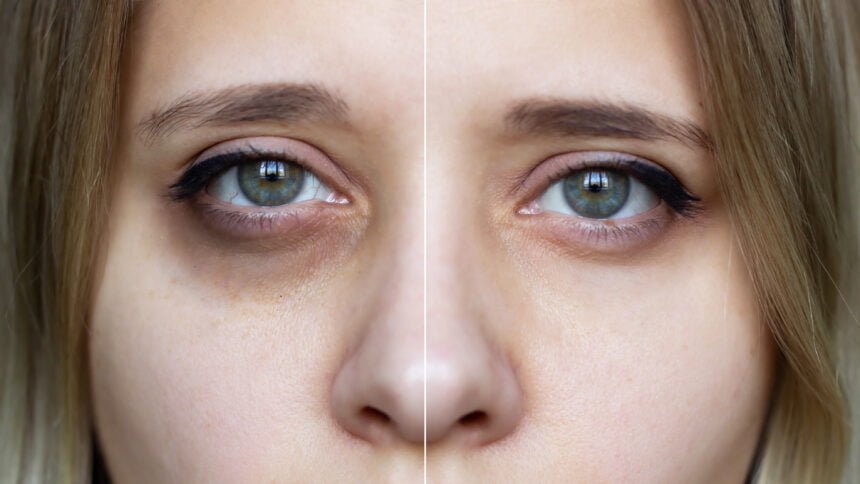Cosmetic treatments can do a lot to improve our mental health. We talked about the role that confidence plays in our self-esteem and how it can help fight depression. This is one of the reasons that we emphasized the importance of the beauty industry for mental health.
One of the ways that you can try to help your mental health by looking better is by fixing the dark circles around your eyes. This is one of the topics that Medical News Today recently talked about. We are going to get into this in more detail in the content below.
Fix Dark Circles Around Your Eyes to Boost Your Mental Health
You’ve got an important meeting in ten minutes. As you give yourself one last glance in the mirror, your heart sinks. Those dark circles under your eyes are impossible to ignore. Will your colleagues think you’re exhausted, stressed, or simply not up to the task? How can fixing them improve your mental well-being?
Dark circles can betray our best-kept secrets, making us look tired even when we’re not. But fear not – whether you’re considering high-tech laser treatments or time-tested remedies, there are options that might help you face the world with confidence.
Understanding Dark Circles
Dark circles under the eyes can be a persistent cosmetic concern, often making us look tired, stressed, or older than we feel. These shadowy areas beneath the lower eyelids can be frustrating to deal with, especially when they seem to appear overnight and stubbornly refuse to fade.
Causes of Dark Circles
Several factors contribute to the development of dark circles.
- Genetics play a significant role, as some people are predisposed to having thinner skin under their eyes or more pronounced blood vessels. UCLA has an article talking about the role of genetics in these conditions.
- Aging is another culprit, as the skin loses collagen and becomes thinner over time, making underlying blood vessels more visible.
- Lack of sleep, dehydration, allergies, and sun exposure may also exacerbate the appearance of dark circles.
Traditional Remedies for Dark Circles
For many, the first line of defense against dark circles involves traditional remedies that can be easily incorporated into daily routines.
Topical Treatments
Over-the-counter creams and serums containing ingredients like vitamin K, retinol and vitamin C may help improve the appearance of dark circles. Vitamin K aids in blood coagulation, potentially reducing the visibility of blood vessels, while retinol promotes collagen production and skin cell turnover.
Lifestyle Changes
Simple lifestyle adjustments can make a significant difference. Ensuring adequate sleep, staying hydrated, and protecting the delicate under-eye area from sun damage with SPF are crucial steps. Reducing salt intake can help minimize fluid retention and puffiness, which can cast shadows under the eyes.
Laser Treatments for Dark Circles
For those seeking more dramatic results, laser treatments have emerged as a popular option in recent years.
How Laser Treatments Work
Laser treatments for dark circles typically use fractional laser technology. This approach creates microscopic injuries in the skin, stimulating the body’s natural healing process and promoting collagen production. Some lasers target pigmentation directly, breaking up melanin deposits that contribute to dark circles.
Expected Results
Patients often report a noticeable improvement in the appearance of dark circles after a series of laser treatments. The skin under the eyes may appear brighter, firmer, and more even-toned. However, results can vary depending on the underlying cause of the dark circles and individual skin characteristics.
Comparing Laser Treatments and Traditional Remedies
When deciding between laser treatments and traditional remedies, it’s essential to consider several factors.
Effectiveness
Laser treatments generally offer more dramatic and faster results compared to traditional remedies. They can address multiple factors contributing to dark circles simultaneously, such as pigmentation, thin skin, and visible blood vessels. Traditional remedies, while often effective, typically produce more subtle improvements over a longer period.
However, the effectiveness of both approaches can vary significantly from person to person. What works well for one individual may not yield the same results for another.
Cost Considerations
The cost difference between laser treatments and traditional remedies is substantial. Laser treatments are typically more expensive, often costing several hundred dollars per session, with multiple sessions recommended for optimal results.
Traditional remedies, such as over-the-counter creams or lifestyle changes, are generally more affordable but may require consistent, long-term use to maintain results.
Choosing the Right Approach for You
When deciding between laser treatments and traditional remedies, consider your budget, time commitment, and desired results. If you’re looking for a more dramatic improvement and are willing to invest in a series of treatments, laser therapy might be the right choice. On the other hand, if you prefer a gradual approach or have budget constraints, traditional remedies could be more suitable.
It’s also worth considering combination approaches. For instance, incorporating a high-quality topical treatment into your daily routine can complement occasional laser treatments or serve as a maintenance strategy between sessions.
For those looking for an effective topical solution, products like Even Glow by Pureance offer a promising middle ground. This serum combines gentle Maple Leaf Extract with a powerful Antioxidant Complex to address multiple skin concerns, including dark circles and uneven skin tone. Its natural, organic formulation makes it suitable for all skin types, potentially offering visible improvements without the need for more invasive treatments.
Conclusion
Ultimately, the best approach for treating dark circles depends on your individual needs, preferences, and skin characteristics. Consulting with a dermatologist or skincare professional can provide personalized advice and help you develop a strategy that works best for your unique situation.
Remember, patience is key when addressing dark circles. Whether you opt for laser treatments, traditional remedies, or a combination approach, consistent care and protection of the delicate under-eye area are essential for maintaining results and preventing further darkening.

